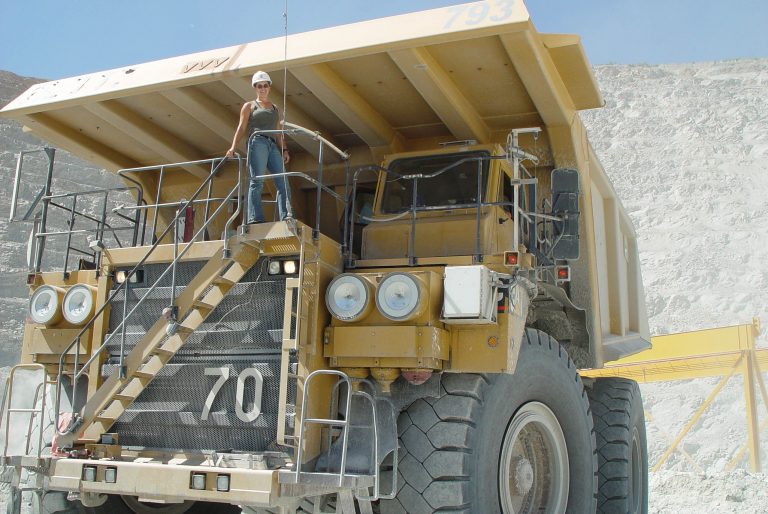Day in the Life: Amberly – Manager, Oil Sands, Canadian Association of Petroleum Producers
- 4 min read
Often regarded as mutually exclusive, a passion for the environment and a desire to work in the oil and gas sector can exist side by side, says Amberly.
A professional engineer and environmental professional, she sees her chosen career as a clear pathway to “advancing environmental protection. As part of the energy sector, there are opportunities to practice environmental engineering and continue gaining practical skills and knowledge,” Amberly explains.

A 2005 graduate of the University of British Columbia’s applied science in chemical engineering (environmental option) bachelor’s program, Amberly is a native of Cranbrook, B.C. After a co-op term with Imperial Oil and graduating, she was hired by the company and moved immediately into an environmental role.
Amberly also recognized the personal benefits of working in oil and gas in Western Canada.
“Frankly, [it] gave me the ability to stay in Western Canada and explore small towns while still living in a big city, which for me was a perk. I got to be in the Calgary office and also had a lot of field work,” Amberly says.
After seven years with Imperial, Amberly took on an environment and regulatory role in thermal operations with Devon Canada (Devon Energy). In 2017, she moved on from Devon to become the manager of Oil Sands for the Canadian Association of Petroleum Producers (CAPP), which is also based in Calgary.
A typical day
“Generally, I will have a series of meetings with different technical or senior leaders in industry and likely meet or have a call with representatives from the Alberta Energy Regulator or government. And I often engage with one or more of my colleagues as we discuss advancement of priority files,” Amberly says.
Her workdays also revolve around data: analyzing it, interpreting it and summarizing it for others. In turn, they use this processed data to make decisions, most often related to the many regulations governing oil and gas operations.
“This is layered with translating technical information from industry subject matter experts to approachable advocacy,” Amberly says. “Then it’s reviewed and advanced by senior leadership and government to enable informed decision-making by all parties.”
If a topic, concern or issue has any relation to oil sands and regulations “I will work on it,” she adds.
Her willingness to jump into work at CAPP has given her a broad perspective across the industry. “Since I like excitement, I work on a lot of different files to support oil sands activities.”
“You can be passionate about the environment and work in the oil and gas industry. There are all sorts of ways you can have a positive impact on the environment. You don’t have to be an activist . . . individuals in roles like mine can truly make a difference and deliver both environmental performance and the energy our society relies on.”
Amberly, BASc, Environmental Chemical Engineering
Mixing interpersonal and technical
Amberly uses her written and interpersonal skills the most on the job, which are shored up by her technical knowledge. She uses those skills to “translate” concepts and processes into information that different audiences—from a layperson to an expert—can understand.

“I’ve become a bit of a jack-of-all-trades over the years,” Amberly says of her broadening understanding of oil and gas production. “You need to make the information right for your audience. You can actually explain quantum physics to a Grade 5 class—you just have to use a different language than quantum physicists would use.”
As well, Amberly says she’s gained the ability to find common denominators among CAPP’s industry members.
“I was working with someone who said we’re often saying the same thing in different ways,” she explains. “In my experience, we can generally find commonalities when we know the goals and objectives people are trying to reach.”
Always learning
“The cool thing at CAPP is you’re exposed to a lot of different opportunities and you’re always learning,” Amberly says when asked what she likes most about her job.
“I would like to take the advocacy skills I’ve learned here into other roles within the oil and gas sector or other industries.”
For now, Amberly relishes her advocacy role within CAPP and the oil and gas sector. It’s given her opportunities to promote and advance environmental protection within the industry.
“You can be passionate about the environment and work in the oil and gas industry,” she says. “There are all sorts of ways you can have a positive impact on the environment. You don’t have to be an activist . . . individuals in roles like mine can truly make a difference and deliver both environmental performance and the energy our society relies on.”
Company
Canadian Association of Petroleum Producers (CAPP)
Location
Calgary, Alberta
Salary
$53,000 to $171,000
Education
BASc, Environmental Chemical Engineering
Salary, education and advancement may vary from company to company.
